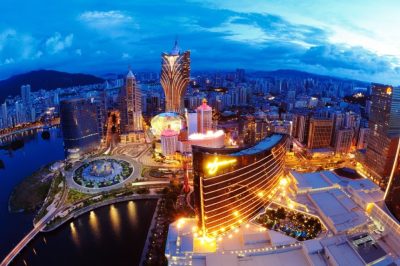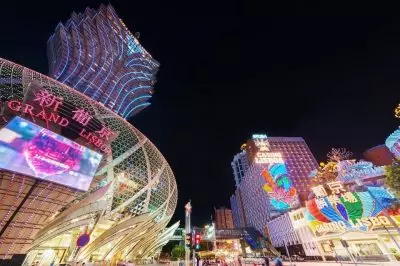 Gross gaming revenue in the semi-autonomous Chinese territory of Macau dropped 8.6 percent year-on-year in August, hit by the slowing economic growth as a result of the ongoing trade war between China and the United States. Operators in the world’s largest gambling hub have also been affected by the protests in Hong Kong, the Typhoon Lekima, as well as current uncertainty over high-roller junkets.
Gross gaming revenue in the semi-autonomous Chinese territory of Macau dropped 8.6 percent year-on-year in August, hit by the slowing economic growth as a result of the ongoing trade war between China and the United States. Operators in the world’s largest gambling hub have also been affected by the protests in Hong Kong, the Typhoon Lekima, as well as current uncertainty over high-roller junkets.
The latest numbers released by Macau’s Gaming Inspection and Coordination Bureau reveal a drop in gaming revenues of more than double than the predicted 4 percent decline for August. Macau casino operators reported a gaming turnover of 24.26 billion patacas ($3 billion) last month, down from 26.6 billion patacas ($3.28 billion) a year earlier. This is a drop of 8.6 percent, the sharpest decline in revenues for 2019.
The figure is slightly lower than the turnover for July, which was 24.4 billion patacas. However, the actual gross gaming revenue (GGR) for August is the third-worst for this year after numbers for April and June. Accumulated GGR totaled 198.218 billion patacas (US$24.777 billion), a slight decline year-on-year of approximately 1.9 percent from the 202.103 billion patacas generated by Macau casinos in the same period of 2018.
According to the Macau Gaming Inspection and Coordination Bureau, there were 41 casinos at the end of the first quarter of the year, hosting 6,734 gaming tables and 17,638 slot machines in total. This included 22 venues operated by Sociedade de Jogos de Macau, another 6 run by Galaxy Casino, 5 casinos owned by Venetian Macau, 4 by Melco Crown Macau, 2 by MGM Grand Paradise, and another 2 by Wynn Resorts Macau.
Multiple Factors Contribute to Decline in Gaming Activity
 The official data from the regulator reveals that casino operators’ gaming revenues have dropped in five out of the eight months in 2019. Multiple factors have contributed to the recent decline in gaming activity, most notably the trade war between China and the United States, which led to a slowing down of the Chinese economy. According to some analysts, the country’s economy has slowed to record numbers in the past three decades.
The official data from the regulator reveals that casino operators’ gaming revenues have dropped in five out of the eight months in 2019. Multiple factors have contributed to the recent decline in gaming activity, most notably the trade war between China and the United States, which led to a slowing down of the Chinese economy. According to some analysts, the country’s economy has slowed to record numbers in the past three decades.
Others, however, believe that Macau’s gambling industry is still resisting the negative impact of the trade war and is more or less immune to the consequences observed in Mainland China. Still, the economy of the special administrative region relies heavily on Chinese tourists, while its currency is indirectly pegged to the U.S. dollar (since the Macanese pataca is 100% backed by the Hong Kong dollar, while Hong Kong’s entire monetary base is backed with US dollars). This makes Macau vulnerable at least to some degree to any turbulences in these two major economies.
The sluggish economy of China is believed to affect gamblers coming from the mainland, most notably high-rollers who are now staying away from the baccarat tables. China’s crackdown on mobile and online gambling apps has also deterred certain VIP players, analysts believe.
The ongoing protests in Hong Kong are also having an impact on the gambling activity across Macau, although the casino industry has not yet been hit seriously by the violence in the neighboring special administrative region. The protests have disrupted transportation from the mainland to both Hong Kong and Macau. The Hong Kong International Airport, in particular, was closed for several days due to the pro-democracy protests.